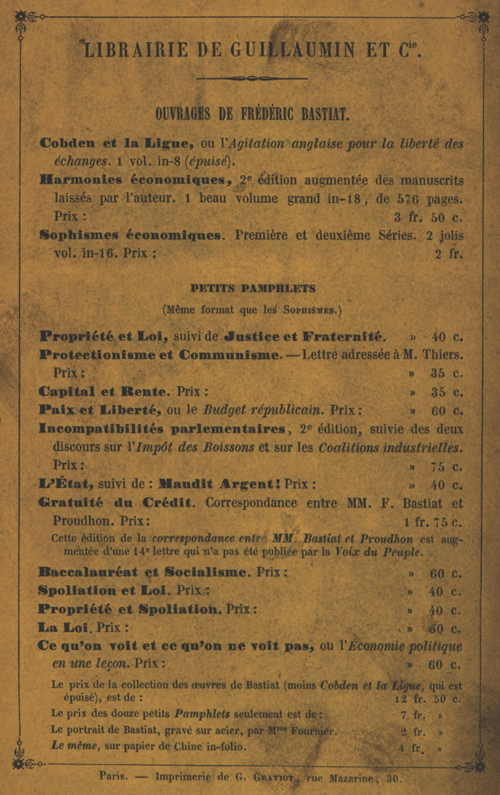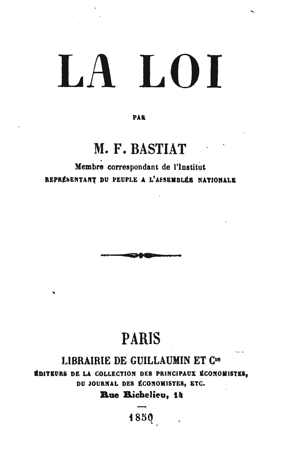One of the most prolific and persuasive critics of socialism in the late 1840s was the economists and free trade campaigner Frédéric Bastiat (1801-1850). Between May 1848 and July 1850 he wrote a series of over a dozen anti-socialist pamphlets, or what the Guillaumin publishing firm marketed in their Catalog as the “Petits pamphlets de M. Bastiat” (Mister Bastiat’s Little Pamphlets), which included several for which Bastiat has become justly famous such as “The State” (June and Sept. 1848), “The Law” (July 1850), and “What is Seen and What is Not Seen” (July 1850). The pamphlets sold well for Guillaumin and they were reprinted several times and even marketed as a set which could be purchased for 7 fr. for the complete set of 12. Some originally appeared in journals such as the JDE, while others were written as stand alone pamphlets.

In two of his Election “Manifestos” which he circulated among the voters in his home district of Les Landes during the election campaign in May 1849,1 which he duly won, he identified the particular socialists whose ideas he was attacking in each one of them. Bastiat also wrote other anti-socialist essays and articles which are also included in the list below.
The “Small Pamphlets” included the following titles. The order of publication is provided by his editor Prosper Paillottet in the Oeuvres complètes , vol. 4, p. 274. We have added the price for each pamphlet from an advertisement we found in one of the Guillaumin books {Note_ 1 franc = 100 centimes]. The Paris Chamber of Commerce estimated that average wage per day for an ordinary worker in Paris at the time was about 3 fr. 80 c.,2 so the cost for a worker who purchased the pamphlet Damn Money! and the State for 40 c. was nearly 11% of their daily wage.
Bastiat’s series of anti-socialist pamphlets and articles (the links are to the works in French and to the English translation at the OLL where available):
1847:
- even before the February Revolution he had addressed the growing threat of socialism in essays like “Du Communisme,” Libre-Échange (27 juin, 1847) which he published in his free trade magazine. In this he criticized the socialist ideas of Philippe Buchez who edited the workers’ magazine L’Atelier (the Workshop) and became the first President of the Republic [ HTML and facs. PDF ]
1848:
- the first article he wrote after the Feb. Revolution was “Funestes illusions” (Disastrous Illusions) JDE (mars, 1848) in which he urged the people to abolish all political and economic privileges and not to replace the old group of “plunderers” with a new group as the socialists were urging them to do [ HTML and facs. PDF ] [English at OLL ]
- “Propriété et loi” (Property and Law) (JDE, May 1848) [40c.] – a defence of property rights against the criticism of socialists like Louis Blanc and others [ HTML and facs. PDF ] [English at OLL ]
- “Justice et fraternité” (Justice and Fraternity) (JDE, June 1848) – a response to the socialist Pierre Leroux [ HTML and facs.PDF ] [English at OLL ]
- “Individualisme et fraternité” (Individualism and Fraternity) (c. June 1848) – an unpublished paper also written to refute the socialist’s claim (esp. by Louis Blanc) that free markets led to ruinous individualism and competition while socialism led to fraternity and brotherhood for the workers. [ HTML ] [English at OLL ] This is a a topic he would return to in several chapters of Economic Harmonies such as chap. X “Concurrence” (Competition) [ HTML ] and XXI “Solidarité” (Solidarity) [ HTML ]
- “L’État” (June, Sept. 1848 and early 1849) [40 c.] : there were three versions of this famous essay – the 1st in June before the June Days riots in Paris which was short and written for the ordinary worker in the streets [English at OLL ]; the 2nd longer version was written for a high-brow magazine in Sept. 1848); and the 3rd longest version was written as a pamphlet and gave a detailed critique of Ledru-Rollin’s socialist (Montagnard) party platform. [ HTML and PDF] [English at OLL ].
- “Propriété et spoliation” (Property and Plunder) (JDD, July 1848) [40 c.] – a defence of property, especially of land (and the charging of rent), against the criticism of Victor Considerant [ HTML and facs. PDF ] [English at OLL ]
1849:
- “Protectionnisme et communisme. Lettre à M. Thiers” (Protectionism and Communism. A Letter to M. Thiers) (Jan. 1849) [35 c.]- addressed to the conservative politician Adolphe Thiers and the protectionist Mimerel committee pointing our the similarities between conservative and socialist policies, namely their use of state coercion to give privileges to some members of society at the expence of others [ HTML and facs. PDF ] [English at OLL ]
- “Capitale et rente” (Capital and Rent) (Feb. 1849) [35 c.] – in opposition to the criticisms of Proudhon and others on the legitimacy of rent. [ HTML and facs. PDF ]
- Maudit l’argent! (Damn Money) (April 1849) – in opposition to socialist misconceptions about money, banking, and debt. [ HTML and facs. PDF ]
- “Propriété, Communauté” (Private and Communal/Community Property) (chap. VIII of Harmonies Économiques 1850) (written mid 1849 and published in the first edition of EH in Jan. 1850) – Bastiat attempts to answer the socialist critique of private property by showing that a system based on private property actually increases the amount of “communal” property to the enormous benefit of all members of the community. [ HTML ]
- “Le capital” (Capital), Almanach Républicain pour 1849 (1849) – against Proudhon and Blanc HTML.
1850

- Baccalauréate et socialisme (The Baccalaureat and Socialism) (early 1850) [60 c.] – written to oppose the teaching of interventionist and statist ideas (“socialism”) in government schools by means of the teaching of the Latin language which was supported by conservatives like Adolphe Thiers [ HTML and facs. PDF ] [English at OLL ]
- Gratuité du crédit. Discussion entre M. Fr. Bastiat et M. Proudhon (Free Credit. A Discussion between M. Fr. Bastiat and M. Proudhon) (1850) 1 fr. 75 c.] – an extended debate with Proudhon over the legitimacy of profit, interest and rent. [ HTML and facs. PDF ]
- Spoliation et Loi (Plunder and Law) (1850) [40 c.] – written to oppose the ideas of Louis Blanc, the Luxembourg Commission, and the National Workshops program [ HTML and facs. PDF ] [English at OLL ]
- La Loi (The Law) (June 1850) [60 c.] – one of the last things Bastiat wrote before his death; a lengthy critique of the ideas of Louis Blanc and the 18th century predecessors of socialist ideas, most notably Rousseau and Robespierre [ HTML and facs. PDF ] [English at OLL ]
- “Liberté, Égalité” (Liberty and Equality) (1850) – a draft of a chapter for the Harmonies Économies which was never published. He attempts to explain how the liberal understanding of “equality” differs from that of the socialists’. [ HTML ] [English at OLL ]
In the last months of his life he wrote on more general economic matters which also covered the errors of all kinds of interventionist policies, including of course, socialist intervention:
- Ce qu’on voit et ce qu’on ne voit pas, ou l’Économie politique en une leçon (What is Seen and What is Not Seen, or Political Economy in One Lesson (1850) [60 c.] – [ HTML and facs. PDF ] [English at OLL ]
- his unfinished treatise on economic theory Harmonies Économiques (Economic Harmonies) : the first half published in his lifetime (10 chaps in early 1850) in facs. PDF ; and a partly “completed” posthumous edition in 1851 (with an additional 15 chapters or sketches of chaps, and an outline of a much larger future work on economic “harmony” and “disharmony”) in HTML and facs. PDF
- “Statement of Electoral Principles in April 1849” OC7.65 and “Statement of Electoral Principles in 1849. To MM. Tonnelier, etc.,” OC1. English at [CW1, pp. 390-95] [↩]
- Chambre de Commerce de Paris [Horace Say], Statistique de l’Industrie a Paris résultant de l’enquête. Faite par la Chambre de commerce pour les années 1847-1848 (Paris: Guillaumin, 1851). “Chap. XXII. 13e Groupe – Imprimerie, Gravure, Papeterie,” pp. 187-94. [↩]
